New Book Releases, Spring 2023
If you would like to alert us to a recent or forthcoming film publication for the next round-up in summer, please contact Ruben Demasure. For notes on more books, see David Hudson’s monthly round-up at Criterion’s The Daily.
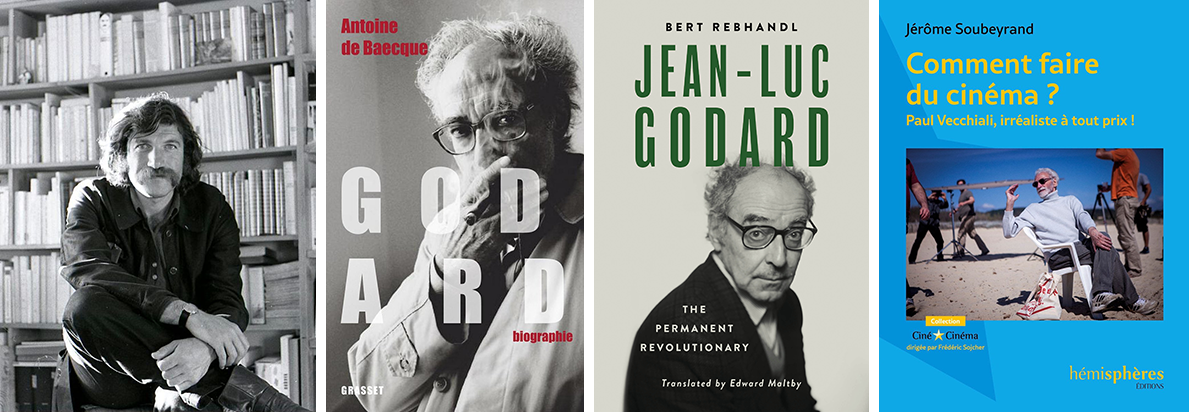
Our previous book note opened with Nicole Brenez’s new publication on the late Jean-Luc Godard. As it goes, more reissues and new books appear in the wake of one’s passing, such as CNRS’s reprint of Arnaud Guigue’s Truffaut & Godard (2014) in May. At the time of his death in October 2021, the Iranian-French writer and critic Youssef Ishaghpour had been working for twenty years on a monumental work on the films of Godard. Now finally forthcoming next May from the publishing house Exils, Jean-Luc Godard, une encyclopédie will give his account, film by film, of the importance of the Franco-Swiss filmmaker. There is no book cover yet. In 2000, Ishaghpour and Godard co-authored Archéologie du cinéma et mémoire du siècle, a dialogue on Godard’s Histoire(s) du cinéma.
Two Godard biographies will be revised and translated. The film historian Antoine de Baecque comes with the “definitive edition” of his 2010 authoritative biography of Godard, then coinciding with Godard’s eightieth birthday and the release of Film socialisme (2010). Again published with Grasset and now counting 960 pages on bible-thin paper instead of 944, Godard - Edition definitive is available for preorder ahead of its release on April 26.
Jean-Luc Godard: Der permanente Revolutionär (2020, Zsolnay Verlag), another biography published on the occasion of Godard’s ninetieth birthday, by the film critic for the Frankfurter Allgemeine Zeitung Bert Rebhandl will be translated into English. Jean-Luc Godard: The Permanent Revolutionary will be released in May from the University of Wisconsin Press.
The same goes for Paul Vecchiali who passed away a couple of weeks after his friend Jean-Luc Godard and even left behind a tribute film to him, Bonjour la langue. Comment faire du cinéma ? Paul Vecchiali, irréaliste à tout prix is at once a practical manual for independent film production, an ode to collective work and a detailed and exhaustive analysis of each of his films by the actor and screenwriter Jérôme Soubeyrand, who worked on Vecchiali's last films. Vecchiali read and approved the manuscript of this book shortly before his death. It will be out in April from Hémisphères Editions.
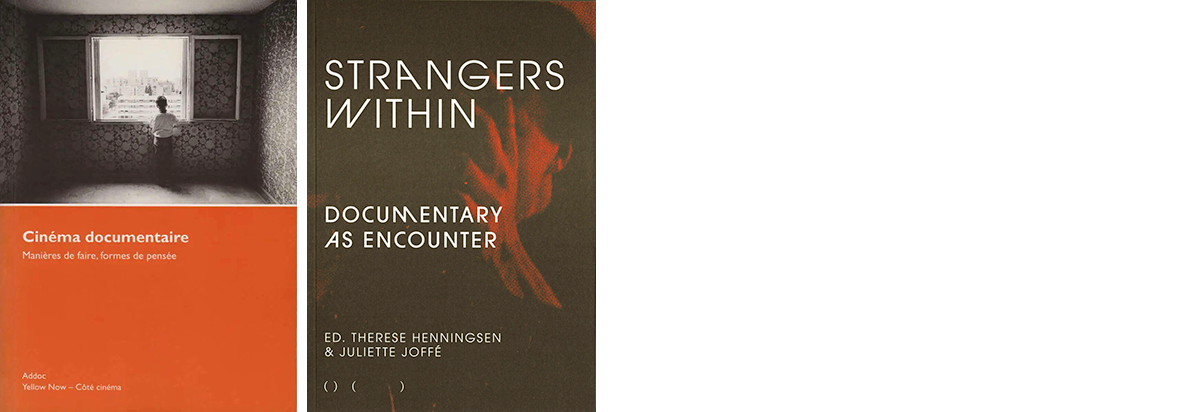
Two new, valuable anthologies about the documentary form have been published. Cinéma documentaire: Manières de faire, formes de pensée aims to break down the barriers between theory and practice and lets documentary filmmakers exchange their ideas, experiences and points of view. The texts gathered here are a synthesis of the debates, reflections and workshops developed over the years by the Association des cinéastes documentaristes (Addoc). The book includes interventions by Nicolas Philibert, Jean-Louis Comolli, Frederik Wiseman and Raymond Depardon, among others. Originally published in 2002, they reissued this reference work together with Yellow Now Editions on the occasion of Addoc’s thirtieth anniversary. Expanded with an afterword by the artistic director of the Cinéma du réel festival, Catherine Bizern, the new edition has been released last month.
Edited by filmmakers and lecturers Therese Henningsen and Juliette Joffé, Strangers Within: Documentary as Encounter explores the idea of documentary as encounter through essays, stories, interviews and other creative responses by filmmakers, artists, and writers, including Khalik Allah, Ruth Beckermann, Annie Ernaux, Gareth Evans, Mary Jiménez, Andrew and Eden Kötting, David MacDougall and Toni Morrison. You can find the table of contents on the website of the independent publishing house Prototype.
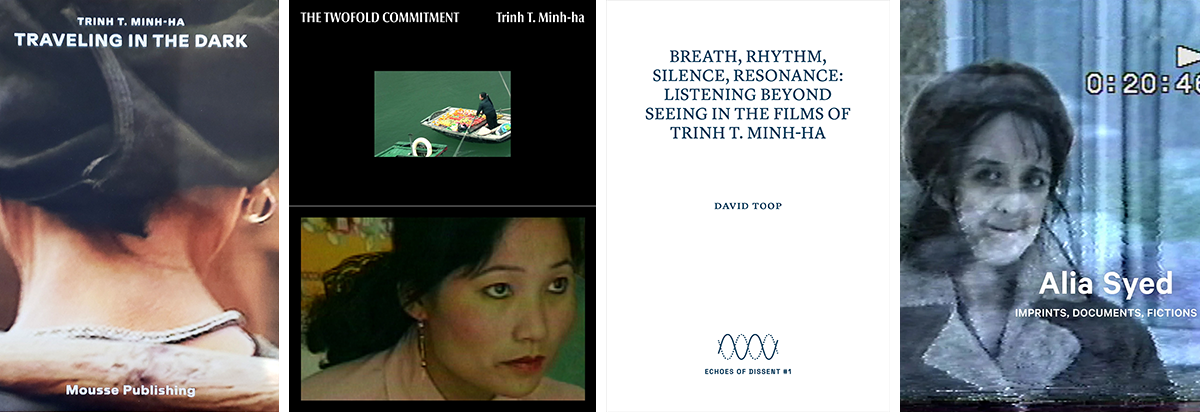
One of the contributors to the latter anthology, the filmmaker and theoretician Trinh T. Minh-ha, has a new publication – Travelling in the Dark, which was conceived from the script and visuals of her film What about China? (2022) and expanded with her writings, poems and aphorisms as well as various interviews. The book was released last month from Mousse Publishing.
Forthcoming on May 2 from Primary Information, a second artist book by Trinh T. Minh-ha centers on another one of her films – Forgetting Vietnam (2015), which takes up one of the myths surrounding the creation of Vietnam. Titled The Twofold Commitment, the publication includes the film’s lyrical script which Trinh refers to as both essayistic and anti-essayistic, along with rhythmically distributed stills. The book also collects a series of conversations and interviews with scholars and critics including Erika Balsom and others that date from 2016 to 2022 and address Trinh’s larger cinematic and theoretical practice.
In the context of a focus on the work of Trinh T. Minh-ha, the Courtisane festival in Ghent, Belgium (March 29 – April 2), invited musician, author and curator David Toop to reflect on the sound work in her films. The resulting book, titled Breath, rhythm, silence, resonance: listening beyond seeing in the films of Trinh T. Minhha, is the first publication in the Echoes of Dissent series, devoted to the politics of the soundtrack. This series is part of the research project of the same name within KASK & Conservatorium School of Arts Ghent.
A second Courtisane publication made in collaboration with Open City Documentary Festival, Alia Syed: Imprints, Documents, Fictions is the first monograph to be devoted to Syed’s work. Edited by María Palacios Cruz, this collection includes new essays by Jemma Desai, Inga Fraser, Peter Gidal, Rahila Haque, Salima Hashmi, Anjana Janardhan, Ruth Noack and Henrietta Williams, as well as writing by Syed herself. The publication will be launched in the filmmaker’s presence at the closing night of the Courtisane festival with a special screening of a series of Syed’s works from the last ten years that reflect on her Asian-Scottish upbringing. Both Courtisane publications are available through their webshop and the bookstall at the festival.
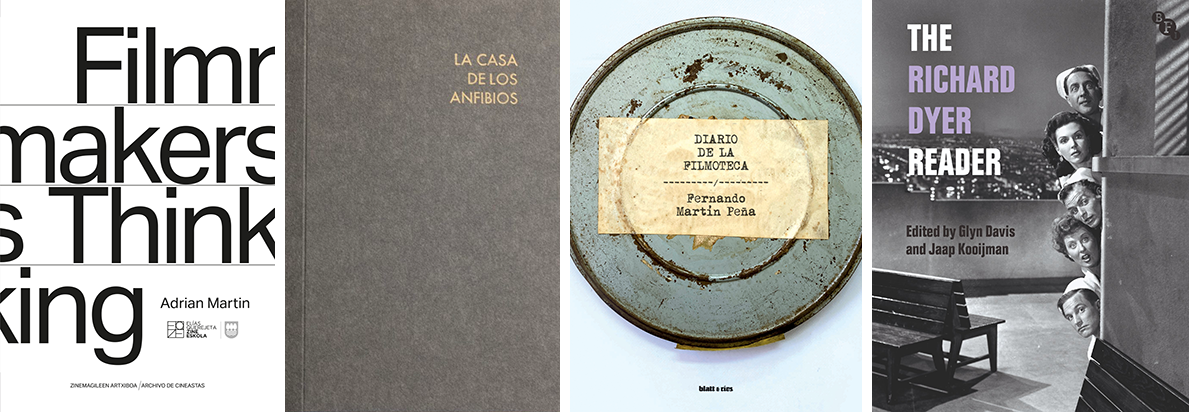
The above-mentioned anthology Cinéma documentaire: Manières de faire, formes de pensée features a citation by Jean-Louis Comolli on its back cover: “Ways of doing are always ways of thinking.” It could be a credo of the highly anticipated new book by the critic Adrian Martin, Filmmakers Thinking. The project has its origins as a lecture course at the Elias Querejeta Zine Eskola (EQZE) in San Sebastian, where it started from a simple but radical proposition: to take seriously what filmmakers themselves say, write and reflect upon when they talk about films. “It arises from a simple but passionately held conviction: that we need to pay more attention, and more respect, to the words of filmmakers. To that end, the book presents, in a particular sequence that I have chosen, the writings, statements and reflections of many filmmaker-thinker-artists,” the author explains. This English language book also includes many less classical examples of theoretician-filmmakers, such as Abigail Child, Isidore Isou, Maya Deren or Philippe Grandrieux. We still await an open-access release or limited run of printed copies.
Another publication by EQZE produced within the framework of their Curating Studies programme, La Casa de los Anfibios: Conversaciones sobre cine is made up of fifteen conversations, including ones with Adrian Martin, programmer María Palacios Cruz, archivist and programmer Charlotte Procter, Berlinale director Carlo Chatrián, filmmaker and musician Takashi Makino and filmmakers Jean-Claude Rousseau, Matías Piñeiro and Mariano Llinás, among others. This collection is available for sale in Spain and pre-sale in Argentina, but you can send an email to the editor Maui Alena on the publication’s website.
Despite decades of struggles and claims, Argentina does not have an official institution in charge of preserving its cinema. Fernando Martín Peña collects what others throw away or abandon and keeps it at home, almost the only possible refuge for that material. Diario de la filmoteca is the record of a universe in extinction, a log of the work of a stubborn collector. He narrates, with erudition and heart, each film from his archive that he sees and the circumstances in which the copies were made. From that simple premise stories emerge in all possible directions. It’s also the work of a critic who shares his conception of cinema and through his curiosity always tries to think everything anew. The book narrates a year in the life of Fernando Martín Peña. He invites us into his daily life and reminds us, if we need it, how beautiful it is to watch films. The publication will be available in April but the publisher Blatt&Ríos launches a special pre-sale starting March 23. ‘Filmoteca’ is also the name of the cult TV show of which Peña has been in charge since its creation more than 20 years ago. Since 2016, he’s doing this together with critic Roger Koza. One of the most-watched programmes on public television, its short discontinuation in 2021 generated a real outcry to let them return to the screen.
Another anthology worth a lifetime of teaching and research, The Richard Dyer Reader brings together for the first time key writings by this foundational figure for the critical study of cinema and popular culture, many of which are not otherwise available. This collection contains six thematic selections of essays and extracts, each centered on a key theme in Dyer's work: stardom and the image, entertainment and ideology, gay politics and representation, whiteness, the pleasures of popular entertainment and textual analysis. A seventh section comprises a selection of interviews conducted across the span of his career, as well as a new interview conducted by the editors Glyn Davis and Jaap Kooijman. The collection includes archival and recent pieces of writing never previously anthologised but also newly commissioned essays, such as “Eisenstein’s Penis” and “The Persistence of Textual Analysis”. The hardback will be released in September from the British Film Institute through Bloomsbury Publishing. You can find the full table of contents on the latter’s website.
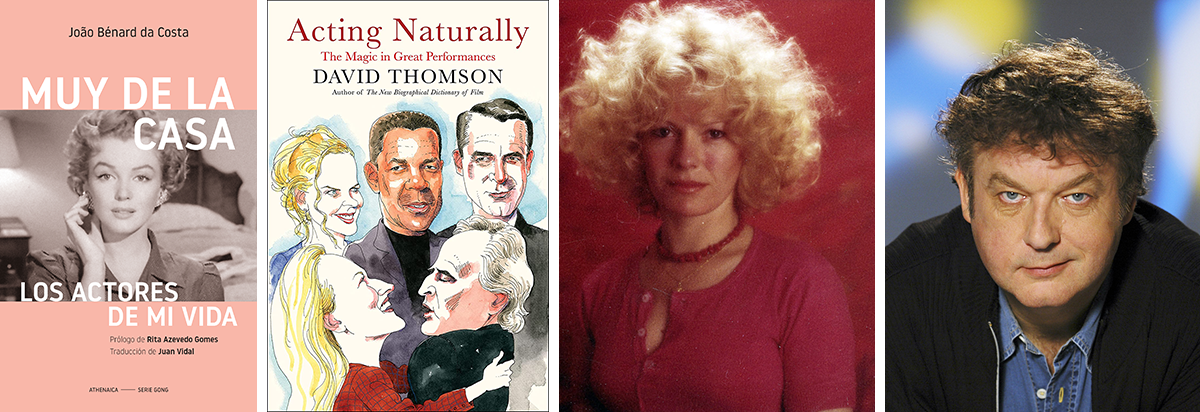
Richard Dyer was a pioneer of the field of star studies and stardom. The next cluster of new or newly translated books on actors present a personal canon of stars. Muy de la casa: Los actores de mi vida is an exquisite collection of mini-biographies of actors and actresses that the long-time head of the Cinemateca Portuguesa and devotional cinephile, João Bénard da Costa, considered “like family”. Originally published in 1993 as Muito là de Casa, the basis of the pieces is made up of Bénard da Costa’s contributions to the newspaper O Independente between 1989 and 1990. Expanded with a foreword by filmmaker Rita Azevedo Gomes, this Spanish translation by Juan Vidal was published at the beginning of this month with Athenaica Ediciones Universitarias. Also graphically designed by Azevedo Gomes and Bénard da Costa’s son, the fifth volume of his collected writings in the Escritos sobre cinema series has just been launched on March 7 at the Cinemateca with a screening of Nicolas Ray’s Bitter Victory (1957). Good for another 1120 pages, this volume alphabetically covers P – R, with texts about Georg Wilhelm Pabst to Mark Rydell.
In Acting Naturally: The Magic in Great Performances, David Thomson also sheds light on actors who have shaped the history of film. The author of The New Biographical Dictionary of Film (1975/2014) analyzes these stars – among them, James Dean, Louise Brooks or Jean Seberg – revealing how a sly smile, an extra-long pause, even a small gesture of the hand can draw in an audience. The book has been available from Knopf since last month.
The previous book note included Jean-Marc Lalanne’s Delphine Seyrig, en constructions, released last month from Capricci. In May, Actes Sud will publish D’Après Delphine Seyrig, a literary essay in the form of an exercise in admiration by the journalist and director of filmmaker documentaries Virginie Apiou. The book is the kaleidoscope of a life, a story in the present moment that looks back at the different mythologies embodied by the actress, director, activist, fashion icon and cat owner.
In Le dictionnaire de ma vie par Dominique Besnehard, the casting director, talent scout and artistic agent Besnehard – unforgettable in his role of the brother of Sandrine Bonnaire in Maurice Pialat’s A Nos amours (1983) – retraces his career in an autobiographical dictionary. He recounts the secrets of a shadowy profession, his encounters with stars, the backstage of filming, his friendships and enmities. The book will be available next month as part of Editions Kero’s series “Le dictionnaire de ma vie”. There is no cover yet for the last two books.
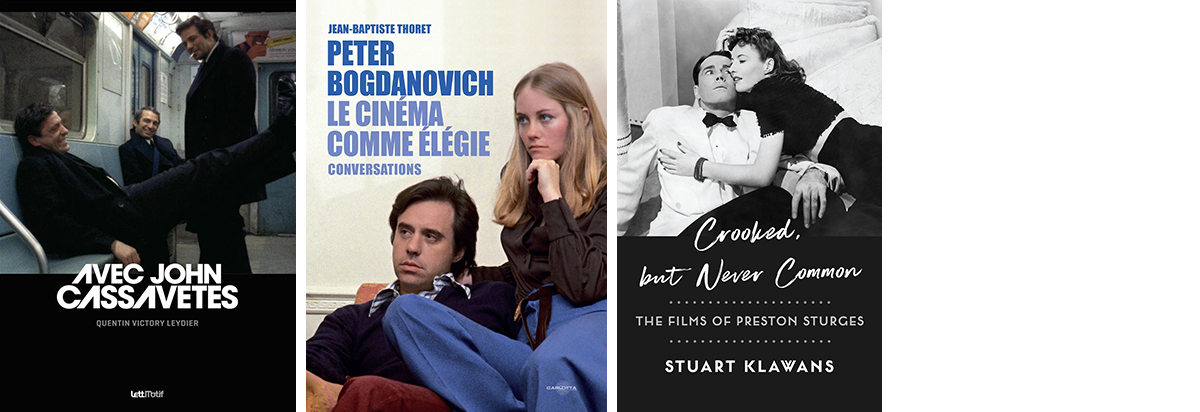
We open the following batch of monographs on filmmakers with Avec John Cassavetes. The author notes that “this book could have been called Cassavetes et moi, the very personal journey of Quentin Victory Leydier, born in 1987, who delves into the career of a filmmaker who died in 1989 – an alignment of the planets and an inevitability that leads to the intimate relationship between a filmmaker, his work and the cinephile.” Leydier, a French teacher in a school just outside Lyon, opted for this free form, like “a little plan scribbled on the corner of a table at the end of an evening.” Less a book about cinema than a personal, very "literary" account, Avec John Cassavetes has been out with LettMottif since last month.
Next month, Carlotta reissues Jean-Baptiste Thoret’s interview book with Cassavetes’s good friend Peter Bogdanovich. On the occasion of the retrospective of his work in April at the French Cinémathèque, it appears as a small paperback instead of the original larger format edition of 2018. Peter Bogdanovich: Le Cinéma comme élégie consists of a conversation between Bogdanovich and the film historian Jean-Baptiste Thoret that began in 2009 and ended in 2018.
As a huge admirer, Peter Bogdanovich wrote the foreword to the 2019 Preston Sturges study that was co-authored by Sturges’s son. In a new book on the filmmaker, Crooked, but Never Common: The Films of Preston Sturges, the longtime film writer for the Nation, Stuart Klawans, combines a critic’s insight and a fan’s enthusiasm to offer deeper ways to think about and enjoy Sturges’s work. Klawans provides an in-depth appreciation of all ten of the writer-director’s major films. Richard Peña, the former New York Film Festival director, commented: “Until now, Sturges’s achievements as a visual artist have been overlooked. Klawans’s study finally remedied that, demonstrating that Sturges was an artist as skilled with the camera as he was with a typewriter.” The book has been out since January from Columbia University Press.
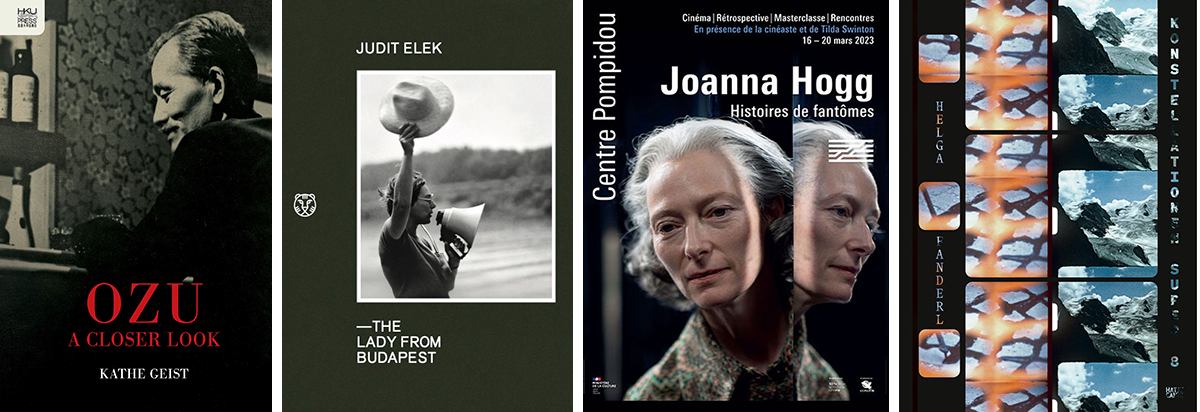
Another attempt to nuance and revise the dominant perception of a canonical filmmaker is made by Kathy Geist in Ozu: A Closer Look. Geist, who was trained as a medieval art historian, has been writing on Ozu since the early 1980s, and the book is based on avenues of research she has pursued over the past thirty years. Geist goes against the film scholar David Bordwell who, according to her, in his reference work Ozu and the Poetics of Cinema believes that “Ozu was too preoccupied with his intricate parametric designs to give much thought to his narratives or their meaning.” Focusing on the latter two aspects of Ozu’s work, the book was published in January by Hong Kong University Press.
One of world cinema’s most uncompromising figures yet little known outside her native country of Hungary, Judith Elek was celebrated at this year’s International Film Festival Rotterdam (IFFR) with a retrospective and a publication dedicated to her work. Launched there on January 29, Judit Elek: The Lady from Budapest largely consists of a long conversation between Elek and the three writers and editors of the publication, Olaf Möller, Gyöngyi Fazekas and Barbara Wurm (who has been announced as the new head of the Berlinale Forum this month). In the interview, they focus on her life to enable readers to better appreciate how close her cinema is to her own history and experience.
Another retrospective of the work of a female filmmaker who’s been only discovered by a large audience with the release of her diptych The Souvenir (2019/2021) is taking place at the Centre Pompidou in Paris this month. On this occasion, Carlotta publishes Joanna Hogg, regards intimes sur l'imaginaire, the first book in French dedicated to the British filmmaker. Each chapter deals with a key theme of her work (the dream, the house, the British bourgeoisie, ...), but through a stylistic exploration, essentially based on visual documents that sketch a portrait of the artist. Martin Scorsese and Tilda Swinton wrote a foreword.
Joanna Hogg started making experimental films with a Super 8 camera borrowed from her mentor Derek Jarman when she was barely 20. The German filmmaker Helga Fanderl (1947) has been making films in Super 8 format since the mid-1980s. Published this month from Hatje Cantz Verlag, Helga Fanderl – Konstellationen Super 8 gives insight into the aesthetic specificity and complexity of her Super 8 work, conveying its origins and development, process and materiality, and form and poetic nature. Photographs, documents and a catalogue raisonné represent and reflect the many facets of her work. This trilingual publication (GE/FR/EN) includes the artist’s short texts, as well as those of different authors, such as Ute Aurand, Robert Beavers, Nicole Brenez, Jeannette Muñoz, Els van Riel and Peter Kubelka, among many others. The book’s graphic design alludes to the density and rhythmic nature of Fanderl’s filmic practice.
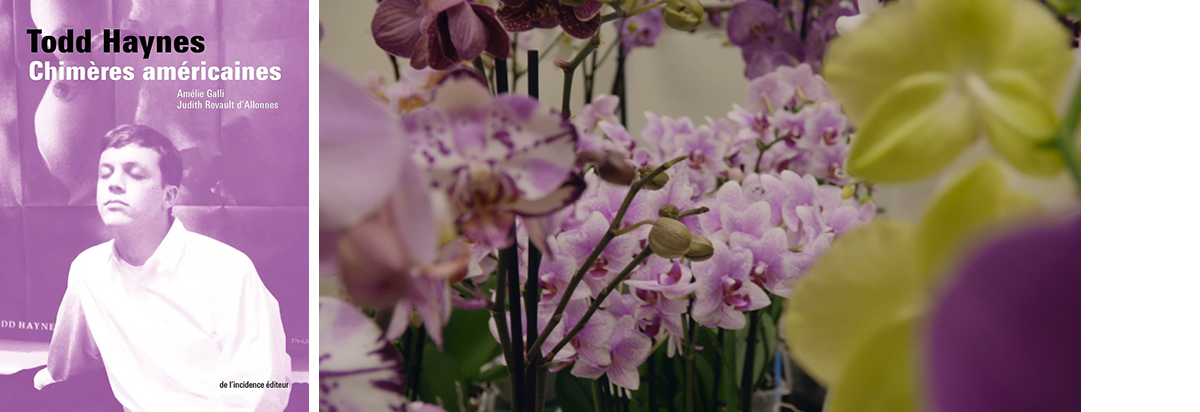
A new monograph on the American independent filmmaker Todd Haynes is one of two forthcoming books by De L’Incidence Editeur. In Todd Haynes: Chimères américaines, the passionate craftsman opens his cabinet of curiosities and shares more than 150 previously unpublished working documents, most of which are kept at the Museum of Moving Image and which tell the story of forty years of uninterrupted creation. Haynes also revisits each of his films and provides an intimate and scholarly analysis in an extensive interview conducted at his home in Portland. Prefaced by his close actress Cate Blanchett, the book will be released on May 19.
The co-director of De L’Incidence Editeur, Robert Bonamy, is finishing a study of the work of innovative and sometimes unrecognized directors who are renewing the art of filmmaking. Forthcoming in September, Rechercher le cinéma contemporain looks into the work of authors who initiate their own conditions of artistic research and draw an international future of cinema, that of the here and now. Among the included filmmakers, the reader will find Bani Khoshnoudi in Iran and Mexico, Intissar Belaïd in Tunisia, David Yon in France and Algeria, Ana Elena Tejera in Panama, Eric Baudelaire in France, Aminatou Echard working with women in Kyrgyzstan and their desire for cinema, and Ugo Simon in France and Senegal.
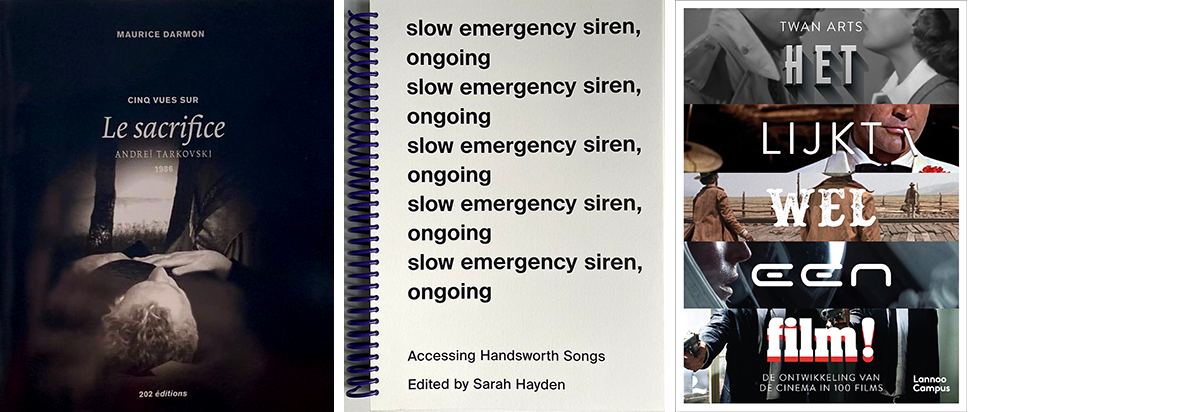
Following their 2019 publication on Andrei Tarkovsky’s Nostalghia (1983), the publishing house 202 Éditions released Cinq vues sur Le sacrifice last January. This richly illustrated booklet offers five takes on The Sacrifice (Offret, 1986) that show how unexpected secrets lie in the smallest details. The Sacrifice was Tarkovsky’s second film as a Soviet expatriate after Nostalghia and was shot in Sweden with the actor Erland Josephson and other alumni of Ingmar Bergman’s crew. There’s a limited print of 200 copies of the book available.
Another limited edition of 200 copies of a monograph on one film in particular – Black Audio Film Collective’s Handsworth Songs (1986) – has already been out since September last year but somehow passed us by. Slow emergency siren, ongoing: Accessing Handsworth Songs documents a project to make this seminal 1986 film more, and differently, accessible. it presents a new commissioned annotated audio description script from Elaine Lillian Joseph and new creative captions commissioned from the Care-fuffle Working Group alongside new essays by Clive Nwonka and Sarah Hayden. The publication is also available in website form designed by An Endless Supply. There are still some copies of the ringbound paperback in stock via the website of the publisher LUX.
The new Dutch book, Het lijkt wel een film: De ontwikkeling van de cinema in 100 films, is also structured per individual film, ten for each decade, from George Méliès’s Le Voyage dans la lune (1902) to… Avengers: Endgame (2019). Released this month, the book is written by the Dutch film teacher Twan Arts who devotes one spread to each title. You can find the table of contents and thus his personal film canon on the website of the publisher Lannoo.
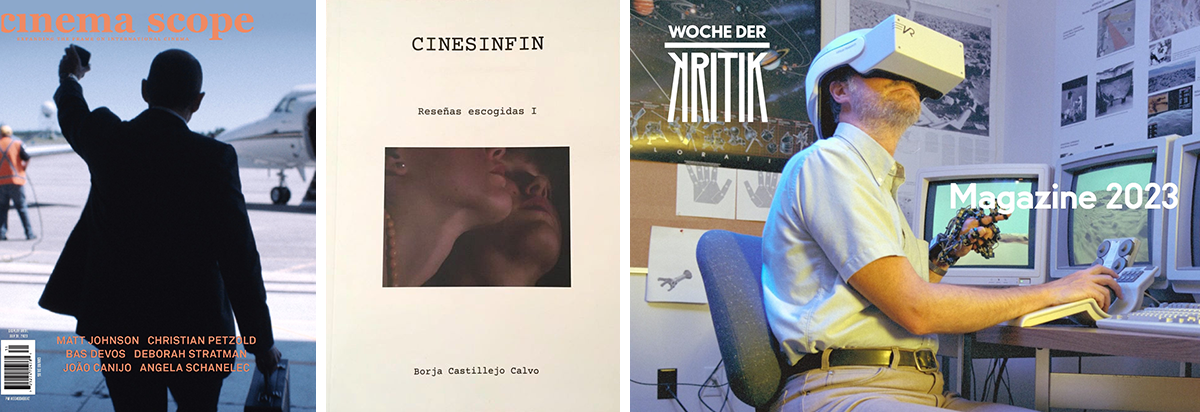
As always, we close with news about the world of film magazines. In his editor’s note in the most recent issue of Cinema Scope, Mark Peranson announced that “the current economics for small magazines such as they are (namely, awful) has made me question the viability of continuing to steer this publication through the troubled waters of the current state of cinema, and the arts in general. I am losing money on each issue [and] a decrease in grant funding for the upcoming year doesn’t help matters. So my resolution for the forthcoming year is to resolve this issue, one way or the other. I had hoped that we would reach the age of 100, but 93 is pretty damned old. We still might get there. I have always felt that for an enterprise like this to continue, I would never ask for support from our readers other than the measly price of a yearly subscription, but it turns out that there aren’t nearly enough of these adventure-seekers among the 8 billion people out there, despite our efforts to produce something meaningful.” Please consider a subscription to one of the best film magazines out there if you haven’t one already. It only costs $30 a year when you’re based in Canada or the US and $50 internationally.
Cinesinfin is a new Spanish film magazine in print founded by critic Borja Castillejo Calvo. The first 65-page issue contains ten reviews of work by Aleksandr Sokurov, Kurt Walker, Nathaniel Dorsky and Stephen Dwoskin, among others. The first edition is limited to 50 copies. You can buy the issue on their website for €12,50 with free shipping worldwide starting March 15. The money will go towards the publication of future issues.
For the third time, the German critic Patrick Holzapfel edited a free online magazine for Woche der Kritik (Berlin Critic’s Week). He notes: “I think it’s very difficult in today’s fast-paced festival environment to have meaningful discussions and so I wanted to have deeper conversations and correspondences that could still be of interest after the festival.” The English language magazine features an email correspondence between him and Andréa Picard, an interview with filmmaker Masao Adachi, a longer essay by Alejandro Bachmann reflecting on implications around the mediation and teaching of cinema, statements on the state of cinema, including Roger Koza’s essay on the way in which European festivals deal with films from Latin America or Tara Karajica’s reflection on what it means to be a mother in the world of film festivals and film criticism, but also a screenshot extravaganza of fetishes in cinema made by the Tumblr user Ozu’s Teapot.
Front image: Pather Panchali (Satyajit Ray, 1955)

